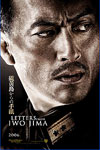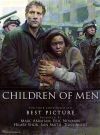Good Movies, but Split Decisions
 Three movies in two days, and the best news is that all of them constitute thumbs-up material. But how far up? In all three cases, I'm having a tough time deciding. In ascending order of quality, Dreamgirls earns the peculiar distinction of being an exuberant, performance-centered movie that I enjoyed without really loving any of the performances. Eddie Murphy was best in show for me; his blurring of the lines between energy, mania, arrogance, cowardice, obedience, and defiance amounted to the only truly layered character in the movie. Everyone else had bright spots and major deficits, which is also true of the movie on the whole: yay for the costumes, yikes on the photography, and sympathy for the editor, who flourishes where the film allows her to but flails to make certain sequences and character arcs cohere. (They still don't.) Nonetheless, Dreamgirls is a buoyant couple of hours with just enough weight to avoid pure frivolity, and just enough sense of when to stop forcing the personal-social analogies and just let things go Bump on a glittering stage. The shaky technique, limited acting, and slow-witted direction make it hard to afford the movie more qualitative credit than a B–, but as with Casino Royale and the recently reviewed Devil Wears Prada, I enjoyed the movie more than the grade implies, and a slight bump upward is not out of the question.
Three movies in two days, and the best news is that all of them constitute thumbs-up material. But how far up? In all three cases, I'm having a tough time deciding. In ascending order of quality, Dreamgirls earns the peculiar distinction of being an exuberant, performance-centered movie that I enjoyed without really loving any of the performances. Eddie Murphy was best in show for me; his blurring of the lines between energy, mania, arrogance, cowardice, obedience, and defiance amounted to the only truly layered character in the movie. Everyone else had bright spots and major deficits, which is also true of the movie on the whole: yay for the costumes, yikes on the photography, and sympathy for the editor, who flourishes where the film allows her to but flails to make certain sequences and character arcs cohere. (They still don't.) Nonetheless, Dreamgirls is a buoyant couple of hours with just enough weight to avoid pure frivolity, and just enough sense of when to stop forcing the personal-social analogies and just let things go Bump on a glittering stage. The shaky technique, limited acting, and slow-witted direction make it hard to afford the movie more qualitative credit than a B–, but as with Casino Royale and the recently reviewed Devil Wears Prada, I enjoyed the movie more than the grade implies, and a slight bump upward is not out of the question. As I so often find with Clint Eastwood's movies, Letters from Iwo Jima occupies an uneasy precipice between rigor and conservatism. Its best moments and strongest decisions encourage loyal advocacy of the whole film, even as its missteps offer vivid warnings against a tendency to overrate Eastwood's movies. Often, especially in dialogue-heavy or character-focused scenes, individual shots are so weighed down with rhetorical or emotional intents that the film doesn't breathe as much as you want it to, and even such promising performances as Ken Watanabe's (as Gen. Kuribayashi), Kazunari Ninomiya's (as Saigo, perhaps the greenest soldier, and a virtual co-lead in the film), or Ryo Kase's (as the uncomfortably disciplined Shimizu) become muffled, their relationship to our world or to modern storytelling a bit stilted and antique. Also, someone should convince Eastwood to rethink his propensity toward weak and arbitrary framing devices. Still, Letters from Iwo Jima does more than capture the perspective, largely occluded in American cinema and history, of the Japanese soldiers. The film powerfully and thoughtfully evokes a sitting-duck atmosphere of pre-ordained defeat while nonetheless encompassing a wide variety of tones and formal approaches—lurking menace, wide panoramas, frenetic motion, forward marches, flickering faces, grisly chamber dramas, wistful moments of isolation. Even better, Letters glides elegantly among these registers, instead of flaunting or stumbling over its heterogeneity of pace and mood. The klutzy structural hiccups of Flags of Our Fathers are mostly avoided (and feel all the more perplexing in retrospect), and while I wasn't fully swayed by such key elements as the color palette and the epistolary motif, the film fought its way up, for now, from a B to a B+.
As I so often find with Clint Eastwood's movies, Letters from Iwo Jima occupies an uneasy precipice between rigor and conservatism. Its best moments and strongest decisions encourage loyal advocacy of the whole film, even as its missteps offer vivid warnings against a tendency to overrate Eastwood's movies. Often, especially in dialogue-heavy or character-focused scenes, individual shots are so weighed down with rhetorical or emotional intents that the film doesn't breathe as much as you want it to, and even such promising performances as Ken Watanabe's (as Gen. Kuribayashi), Kazunari Ninomiya's (as Saigo, perhaps the greenest soldier, and a virtual co-lead in the film), or Ryo Kase's (as the uncomfortably disciplined Shimizu) become muffled, their relationship to our world or to modern storytelling a bit stilted and antique. Also, someone should convince Eastwood to rethink his propensity toward weak and arbitrary framing devices. Still, Letters from Iwo Jima does more than capture the perspective, largely occluded in American cinema and history, of the Japanese soldiers. The film powerfully and thoughtfully evokes a sitting-duck atmosphere of pre-ordained defeat while nonetheless encompassing a wide variety of tones and formal approaches—lurking menace, wide panoramas, frenetic motion, forward marches, flickering faces, grisly chamber dramas, wistful moments of isolation. Even better, Letters glides elegantly among these registers, instead of flaunting or stumbling over its heterogeneity of pace and mood. The klutzy structural hiccups of Flags of Our Fathers are mostly avoided (and feel all the more perplexing in retrospect), and while I wasn't fully swayed by such key elements as the color palette and the epistolary motif, the film fought its way up, for now, from a B to a B+. Finally, as ethically ambitious and horribly battle-scarred as Letters from Iwo Jima is, Alfonso Cuarón's Children of Men has got Eastwood's movie beat on both counts. The long and frequent sequences of ambush, assault, and outright siege are intellectually provocative, and would be even more so if they weren't so viscerally upsetting. I had to force myself to keep watching the screen more times during Children of Men than during any other 2006 release, with the possible exception of Apocalypto. Thankfully, Cuarón's movie has all the integrity that Gibson's sun-dappled snuff film lacks. Indeed, Children of Men is so muscular, kinetic, and adult in its concerns, and so virtuosic in its formal and technical execution, that it's bound to look gargantuan compared to the limping irrelevancies (Stranger than Fiction, Bobby, Curse of the Golden Flower) and the hobbled half-successes (Borat, Pan's Labyrinth, even Dreamgirls) that have filled the plexes of late.
Finally, as ethically ambitious and horribly battle-scarred as Letters from Iwo Jima is, Alfonso Cuarón's Children of Men has got Eastwood's movie beat on both counts. The long and frequent sequences of ambush, assault, and outright siege are intellectually provocative, and would be even more so if they weren't so viscerally upsetting. I had to force myself to keep watching the screen more times during Children of Men than during any other 2006 release, with the possible exception of Apocalypto. Thankfully, Cuarón's movie has all the integrity that Gibson's sun-dappled snuff film lacks. Indeed, Children of Men is so muscular, kinetic, and adult in its concerns, and so virtuosic in its formal and technical execution, that it's bound to look gargantuan compared to the limping irrelevancies (Stranger than Fiction, Bobby, Curse of the Golden Flower) and the hobbled half-successes (Borat, Pan's Labyrinth, even Dreamgirls) that have filled the plexes of late.Still, Children of Men has its own seams and riddles to answer for. Does the context and density of the action actually deepen as the film continues, or do we simply behold more grand-scale dioramas of the same recurring ideas? Does the movie's nervy hodgepodge of fascism and anarchy actually make sense, and if the whole world is as scabbed as we are led to believe, what's keeping Danny Huston alive in his gleaming white palace, or Michael Caine protected in his hibernating-activist glade? If we followed the money, or the gasoline, or the coffee, or the still-circulating newspapers, or the prowling tanks, where would they lead? In fact, how is Britain, or even the world, still possible? I ask with a tone of slightly confused skepticism—a skepticism that becomes more curt and disappointed when it confronts some implausible escapes, an ill-placed monologue by a midwife, and the bizarre non-character extended to us by an atypically flat Julianne Moore. Still, so much is bracing and magnificent in Children of Men, a film thrillingly imagined even as it floods itself with despair, that I'm content to persist in my questions and second-guessing, taking them less as signs of muddy artistry than as felicitous products of a smart, complicated movie that deserves smart, complicated consideration. B+? A–? B+? Stay tuned.
Labels: Movies 2006

















2 Comments:
agree with most of this, i do, even though we definitely split big time on curse of...
I thought Dreamgirls improved on second viewing. Not in any revelatory way but my expectations were lowered (which helped) and the performances didn't feel quite as forced or edited together. I still think that story-telling wise it's a mess and I agree with you (from the earlier conversation) that Myhre's production design is flat --largely lacking in character apart from perhaps Beyoncés LA enclave. It's getting a lot of credit because the glittery costumes make everything sparklier
Do you hear that? That's the sound of me crying all the way in Korea about missing Clive Owen attempting to save the human race.
Post a Comment
<< Home